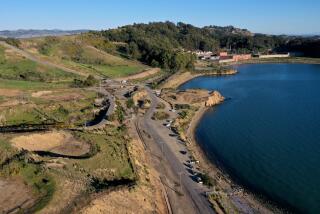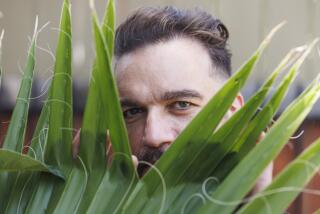Paul’s Last Garden
- Share via
The trail through Temescal Gateway Park is tree-shaded and cool, winding past a stream that splashes over rocks and curves around tall reeds.
Feathery ceanothus bushes dust the surrounding hillsides with pale blues and shades of muted white, and the buds of the sycamores struggle to burst into life on a day that hints of spring.
Even in the intense heat of Sunday, the trail manages to maintain its heatless serenity, absorbing the cooler air that blows up Sunset Boulevard from the ocean just a few blocks away.
This is a place of quiet contemplation, more holy than most chapels, a nest of nature’s beauty so fragile it seems almost dreamlike; and by the events of this day, I suppose it is. For this is Paul’s garden now.
I write for the last time of Paul Monette, the gifted writer of poems and stories, who died last week of AIDS. He was 49.
For the past five years I have been the unwitting chronicler of the disease that took his life, watching as his immune system crashed and his strength ebbed, until all that was left was a whisper.
That whisper is the breeze that rustles the treetops now, and the energy that once drove his prose drives the stream to the sea. The serenity is his gift to us all.
*
I went to his memorial service on Sunday morning, and later stopped at Gateway Park to think about what I would write.
All of my interviews with Paul took place in the small garden behind his West Hollywood home. The changing face of the garden came to be a metaphor for the swiftly passing seasons of his life, from the ebullience of spring to the melancholy overcast of winter.
I thought about going back to the garden after the memorial service, but realized it would be an intrusion on the grief that shrouds the now quiet house on North Kings Road.
We’d had many conversations in that garden. I had arranged an interview in the first place after reading “Borrowed Time,” a book of tears and rage about the AIDS death of his beloved friend, Roger Horwitz.
Paul told me then he was HIV positive and probably had only a short time to live.
He spoke, however, not only of his grief, but also of his anger toward a government that seemed unconcerned with the terrible ravages of a disease that threatened poets and athletes alike.
Those who spoke at his service acknowledged the anger he ultimately put into books and poems, challenging gays and straights alike to rise up against a plague that has infected 2.5 million human beings around the world.
“He became the standard-bearer for an army,” one speaker said. “His integrity lit the battlefield with truth.”
And then his companion, Winston Wilde, asked the audience to stand and join in a final applause for Paul Monette. It began softly, almost self-consciously, and then rose to a long and roaring crescendo.
“This is for you, Paulie,” Winston said.
*
I wandered for three hours through Gateway Park, finally settling by a place in the stream where rocks had created a small waterfall, spraying droplets into the air that gleamed like shards of sunlit crystal.
Nearby, children played in the stream, and I could hear their shouts and giggles through the greenery that separated us. Couples walked on the trail behind me, moving with respect through the cathedral nature had provided.
I was never sure when I wrote about Paul whether I was paying homage to an exceptional writer or using him to establish for others how terrible AIDS is. I try to humanize broad issues through the souls of single individuals, and I guess it was true in his case. I think he understood.
Knowing he had only weeks to live, he worried on our last conversation together that he would be forgotten, and I suppose that’s possible. Only Shakespeare and a handful of others have managed to maintain a degree of permanence in the eternal culture.
How much Paul Monette would have achieved had he lived longer will never be known. That’s part of the horror of the disease that took him, leaving unanswered questions and unwritten words; poems left dangling and songs left unsung.
I stayed by the stream in Gateway Park until the afternoon was gone and took one last look around. And then I knew the theme of the final column I would write about Paul Monette. This would be his new garden now, heaven and earth and all things in it.






